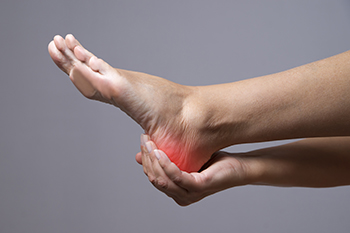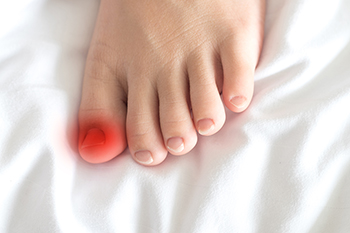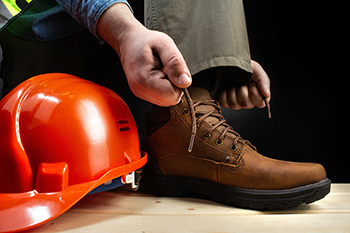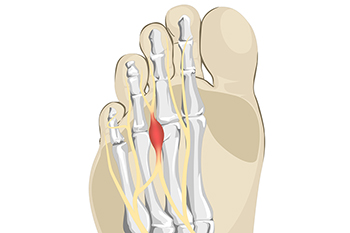Connect With Us
Blog
Items filtered by date: February 2023
Why Does My Heel Hurt When I Walk?

The heel is generally the first thing that hits the ground when you take a step. Since walking is something that people do throughout the day, heel pain can easily develop. And if you suffer from Achilles tendonitis or plantar fasciitis, just walking from one room to another can become painful. Achilles tendonitis is the inflammation of the tendon that connects the calf muscles to the heel. Tiny tears cause swelling, stiffness, and pain, especially in the back of the heel. Plantar fasciitis occurs when the tissue that runs under the sole of the foot develops tears, causing extreme pain felt mainly in the heel. It is thought to be an overuse injury, largely the result of overtraining. Plus, bone spurs can develop along with plantar fasciitis, increasing the pain felt when walking. A number of other conditions can cause heel pain when you walk. Included are bursitis, stress fractures, and compression of the nerves at the back of the ankle and heel. If heel pain while walking becomes persistent or worsens, it is suggested that you seek the attention of a podiatrist who can determine the cause and offer treatment options.
Many people suffer from bouts of heel pain. For more information, contact the foot specialists of Affiliates in Foot Care, P.C.. Our doctors can provide the care you need to keep you pain-free and on your feet.
Causes of Heel Pain
Heel pain is often associated with plantar fasciitis. The plantar fascia is a band of tissues that extends along the bottom of the foot. A rip or tear in this ligament can cause inflammation of the tissue.
Achilles tendonitis is another cause of heel pain. Inflammation of the Achilles tendon will cause pain from fractures and muscle tearing. Lack of flexibility is also another symptom.
Heel spurs are another cause of pain. When the tissues of the plantar fascia undergo a great deal of stress, it can lead to ligament separation from the heel bone, causing heel spurs.
Why Might Heel Pain Occur?
- Wearing ill-fitting shoes
- Wearing non-supportive shoes
- Weight change
- Excessive running
Treatments
Heel pain should be treated as soon as possible for immediate results. Keeping your feet in a stress-free environment will help. If you suffer from Achilles tendonitis or plantar fasciitis, applying ice will reduce the swelling. Stretching before an exercise like running will help the muscles. Using all these tips will help make heel pain a condition of the past.
If you have any questions please contact our office located in Woburn, MA . We offer the newest diagnostic and treatment technologies for all your foot and ankle needs.
Causes of an Ingrown Toenail

The painful foot condition that is known as an ingrown toenail can happen from wearing shoes that are too tight. It may also occur from improperly trimming the toenails, or possibly if it tends to run in families. An ingrown toenail generally affects the big toe, and is noticeable as the nail grows into the skin instead of over it. Symptoms can include swelling, redness, and it may become infected. Some patients find temporary relief as they soak their feet in warm water, followed by gently pulling the skin away from the nail. An ingrown toenail will generally produce pain and discomfort, and there is no mistaking what it is from. If you have developed an ingrown toenail, it is suggested that you are under the care of a podiatrist who can properly assess and treat this condition.
Ingrown toenails may initially present themselves as a minor discomfort, but they may progress into an infection in the skin without proper treatment. For more information about ingrown toenails, contact the foot specialists of Affiliates in Foot Care, P.C.. Our doctors can provide the care you need to keep you pain-free and on your feet.
Ingrown Toenails
Ingrown toenails are caused when the corner or side of a toenail grows into the soft flesh surrounding it. They often result in redness, swelling, pain, and in some cases, infection. This condition typically affects the big toe and may recur if it is not treated properly.
Causes
- Improper toenail trimming
- Genetics
- Improper shoe fitting
- Injury from pedicures or nail picking
- Abnormal gait
- Poor hygiene
You are more likely to develop an ingrown toenail if you are obese, have diabetes, arthritis, or have any fungal infection in your nails. Additionally, people who have foot or toe deformities are at a higher risk of developing an ingrown toenail.
Symptoms
Some symptoms of ingrown toenails are redness, swelling, and pain. In rare cases, there may be a yellowish drainage coming from the nail.
Treatment
Ignoring an ingrown toenail can have serious complications. Infections of the nail border can progress to a deeper soft-tissue infection, which can then turn into a bone infection. You should always speak with your podiatrist if you suspect you have an ingrown toenail, especially if you have diabetes or poor circulation.
If you have any questions, please feel free to contact our office located in Woburn, MA . We offer the newest diagnostic and treatment technologies for all your foot care needs.
Preventing Foot Problems if You Work on Your Feet

Some jobs require one to stand on their feet for prolonged time periods. This can cause tiredness and increase the risk of foot problems as it puts strain on bones, joints, tendons, muscles, and ligaments. Standing for long periods of time can reduce blood flow to the lower extremities or create an accumulation of blood in the foot or ankles, also leading to soreness. Flat feet, plantar fasciitis, and edema are all problems associated with working on your feet all day. Tips for preventing such pain include taking more seated breaks, standing on different surfaces, using anti-fatigue mats underfoot, and wearing appropriate footwear. Footwear includes shoes and socks, and both should fit well, without being too tight or loose. Shoes should support the arch well and have cushioning that absorbs shock and stress. If you work on your feet all day and have foot problems, see a podiatrist who can provide additional suggestions to help you feel more comfortable.
While working on the feet, it is important to take the proper care of them. For more information about working on your feet, contact the foot specialists from Affiliates in Foot Care, P.C.. Our doctors will treat your foot and ankle needs.
Working on Your Feet
Standing on your feet for long periods of time can cause stress and pain in your feet. Your whole body may experience change in terms of posture, back pain, bunions, callouses and or plantar warts. There are ways to avoid these conditions with proper foot care, smart choices and correct posture.
Positive Changes
Negative heeled shoe – Choosing this shoe type places the heel slightly lower than the ball of the foot. These are great for overall foot health. Find shoes that fit you correctly.
Go barefoot – Our feet were not designed to be enclosed for all hours of the day. Try to periodically expose your feet to air.
Eliminate Pain
Foot Exercises – Performing simple exercises, incorporating yoga and doing stretches are beneficial. This will allow increased blood flow to the area and muscles of the foot.
Achilles tendon – Stretching the foot out flat on the floor will relax the calf muscles and tendon. These exercises can be performed almost anywhere. Make sure you add these exercises to your daily regimen.
With a little bit of this information and knowing more about foot health, you will notice changes. Foot stretches and proper footwear will help with pain and prevent further issues.
If you have any questions please feel free to contact our office located in Woburn, MA . We offer the newest diagnostic and treatment technologies for all your foot and ankle needs.
A Common Cause of Morton’s Neuroma

The foot condition that is known as Morton’s neuroma affects the nerve between the third and fourth toes. It generally happens to women who frequently wear high heels, which can compress the toes. In severe cases, the pain can be excruciating, and relief methods are often sought. The symptoms that many patients feel can be likened to having a small pebble or stone in the shoe, and the foot may tingle or feel numb. In mild cases, temporary relief may be found when wider shoes are worn with a low heel, and extra weight is shed, if applicable. Additionally, wearing soft insoles in wider shoes may help to lessen the pressure on the nerve. People who suffer from Morton’s neuroma often seek the counsel of a podiatrist, who can recommend the correct treatment, which may include surgery for the removal of the nerve.
Morton’s neuroma is a very uncomfortable condition to live with. If you think you have Morton’s neuroma, contact the foot specialists of Affiliates in Foot Care, P.C.. Our doctors will attend to all of your foot care needs and answer any of your related questions.
Morton’s Neuroma
Morton's neuroma is a painful foot condition that commonly affects the areas between the second and third or third and fourth toe, although other areas of the foot are also susceptible. Morton’s neuroma is caused by an inflamed nerve in the foot that is being squeezed and aggravated by surrounding bones.
What Increases the Chances of Having Morton’s Neuroma?
- Ill-fitting high heels or shoes that add pressure to the toe or foot
- Jogging, running or any sport that involves constant impact to the foot
- Flat feet, bunions, and any other foot deformities
Morton’s neuroma is a very treatable condition. Orthotics and shoe inserts can often be used to alleviate the pain on the forefront of the feet. In more severe cases, corticosteroids can also be prescribed. In order to figure out the best treatment for your neuroma, it’s recommended to seek the care of a podiatrist who can diagnose your condition and provide different treatment options.
If you have any questions, please feel free to contact our office located in Woburn, MA . We offer the newest diagnostic and treatment technologies for all your foot care needs.

